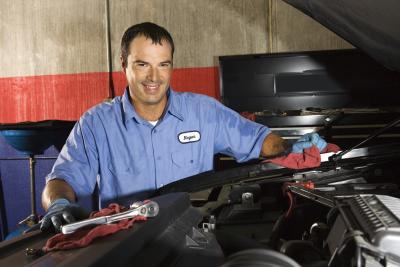
On a Chevrolet truck or car running a V6 or V8 engine, a set of transmission cooler lines typically runs from the front of the vehicle by the radiator into the transmission. This small radiator helps to cool the transmission fluid in the same way the radiator drops the temperature of coolant for the engine. Transmission cooler lines typically last for years. It takes time for vibrations, corrosion and things like that to damage them. In this case, the project vehicle is a 1995 Chevrolet Silverado with a 5.7l V8, but the process is similar for other Chevys.
Pop the hood and unbolt the top of the grill from the core support using a 1/4-inch ratchet and socket. Unscrew the marker lenses from the grill using a Phillips-head screwdriver, and twist out the bulbs in the lenses to remove the marker lights from the grill. Reach inside of the marker light holes to access the tabs on the bottom of the grill which keep it in place, then push them down and pull the grill off of the truck.
Lift up the front of the vehicle using the jack and secure it on jack stands. Make sure the vehicle is completely secure on the jack stands before you crawl underneath it.
Place the drain pan underneath the core support of the vehicle. Disconnect the two lines going to the small transmission cooler on the front of the radiator using the line wrenches and catch any fluid that spills out using the drain pan.
Crawl underneath the truck and follow the transmission lines back to the transmission, unbolting them from their mounting points on the frame using a 3/8-inch ratchet and socket. Then disconnect the lines from the transmission using the line wrenches.
Twist the lines from underneath the truck to maneuver them around the radiator, then the engine, until they're completely out of the truck.